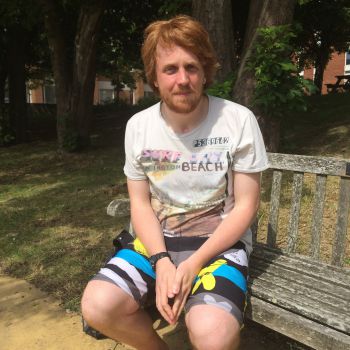Sean gains a "first" in Physics after suffering a major brain trauma
By: Jacqui Bealing
Last updated: Thursday, 9 July 2015

Sean Butchers
Four and a half years ago Sean Butchers’ parents were preparing for the worst. Their son, who had just started a physics degree at the University of Sussex, was in a coma after road accident. If he regained consciousness, there was a significant chance he would be severely disabled.
On 16 July Sean will walk across the stage of the Brighton Dome to receive not just a “first” for his MPhys in Physics with Astrophysics, but also a prize for the producing the best project on his course.
No one is more surprised by his full recovery than Sean himself. “It’s like being in a film script. Life doesn’t generally work out like this. It has been pretty damned perfect.”
On 11 December in 2010, Sean, now 23, was involved in an accident with a bus on the Sussex campus. It was the last day of term and he had been celebrating with friends after handing in course work.
Sean has no memories of the incident or the days that followed. A CT scan revealed that, although there were no back or neck injuries, he had suffered excessive trauma to the brain, causing it to swell.
While doctors decided the best course of action was to remove a section of his skull (a procedure called decompressive craniectomy) to reduce the pressure in his brain, Sean’s parents Helen and Simon were informed that, even if he survived, the injury could change their son forever.
“I was close to death,” says Sean. “My parents have told me that it was looking really grim. The issue with the brain swelling is that blood can’t circulate and brain cells begin to die.The part of my brain affected was the frontal lobe, which is the area for personality.”
For 12 days Sean, who was treated at Brighton’s Royal Sussex County Hospital and then at Hurstwood Park Neurosciences Centre in Haywards Heath, was in a chemically induced coma. He recovered consciousness a few days before Christmas.
It wasn’t until 31 December that he became fully aware of his clinical surroundings and what had brought him there. “It was probably the scariest day of my life. I was told all that had happened to me and I didn’t want to believe it.”
Remarkably, neurological tests showed that Sean had lost none of his cognitive (thinking) ability. And as far as he is aware, his personality is the same as it was before the accident. “Nobody has told me I a different.”
But the trauma had damaged the part of his brain responsible for balance. “Like a child, I went through the process of learning to walk again, and strength building. I’d lost four stone in just three weeks. ”
Sean was transferred to a brain injury unit at Poole Hospital – close to his parents’ home – for further rehabilitation and occupational therapy, such as being sent on “shopping errands” to see how he would cope with a list of tasks. He was also fitted with a helmet that he had to wear at all times to cover the missing part of his skull.
In July 2011, Sean underwent another operation to have a titanium plate fitted to his skull. He has a scar across the top of his forehead, now hidden by his hair.
By then, he was already hoping to return to university. With the help of the admissions team at Sussex and the support of his family and doctors, Sean was able to restart at Sussex in the autumn of 2011.
“I was nervous," he remembers, “but not because of the accident. I had this niggling fear that I wouldn’t be able to cope. One of the effects of a brain injury is brain fatigue. Because the healing process in the brain takes such a long time, effectively some of the energy you would use for the rest of the body is being used by your brain.
“I was worried that I wouldn’t be able to keep up with the demands of a degree. At times I found it hard, but I figured out a way and got 79 per cent in my first year – that’s nine per cent over a first.”
Sean continued putting in the effort, and was able to convert his degree to one with a research placement, which meant he was paid to carry out research during the summer break.
Sean, whose parents are not university educated (his dad is a postman, his mum a special needs assistant in a school), admits that the accident probably changed his attitude to studying.
“It’s a cliché, but it’s true that when you have come close to losing your life – and under the circumstances, it was where I could have woken up as a vegetable – you just respond to things in a different way. I did work harder the second time around. I still am.”
Sean, who plans to stay at Sussex to take a PhD in theoretical astrophysics, adds: “If I hadn’t been taught so well at Sussex, I wouldn’t have been able to do what I have done. It’s fantastically interesting. You look at the world in a different way after doing a physics degree.”

